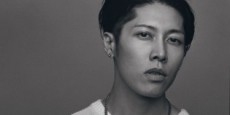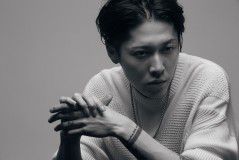MIYAVI『The Others』インタビュー
NeoL / 2015年6月15日 17時1分

MIYAVI『The Others』インタビュー
昨年LAに拠点を移し、またもや更新された、MIYAVIの新次元。MIYAVIのニューアルバム『The Others』は、プロデューサーにグラミー受賞チームであるドリュー&シャノンを迎え、彼らのホームであるナッシュビルに渡り刺激的なセッションによって作り上げられた。MIYAVIは本作でギターをテレキャスターに持ち替え、専売特許であるスラップ奏法を“必然的に”抑えている。そして、楽曲全体がリズムであり、グルーヴであり、歌であるという境地を開拓した。それでもMIYAVIは“まったくもって満足してないよ”と言う。とめどなく上昇する男の今を、ストレートな言葉で語ってもらった。
MIYAVI once again reinvented himself after moving his base of operations to Los Angeles last year. His new album, “The Others”, was produced by Grammy winners Drew Ramsey and Shannon Sanders, and was recorded in Nashville after a series of creatively productive sessions in the city. He changed his main guitar for a Telecaster, and toned down his unique slap playing style “out of necessity”. As a result, the album displays a brand new sense of rhythm, groove and lyricism. Even so, MIYAVI says he’s “not at all satisfied”. The endlessly rising star candidly explained in his own words:
——また飛躍的な更新を果たしたね。手応えはどうですか?
MIYAVI「アルバム? いや、まだまだ満足してないよ」
——してないんだ。
MIYAVI「うん、天の邪鬼な言い方に聞こえるかもしれないけど、ホントに満足してない。もちろん今のMIYAVIがやれること100%、すべてを詰め込んだアルバムであることに変わりはないんだけど、この作品を通して得たことや学んだことがあまりにデカくって」
——次に向けた目線が上がったからこそ、現時点に満足できない。
MIYAVI「そうだね。もう次しか見てない。あのね、去年はホントに日本に帰ってこようかなと思ってくらい」
——しんどくて?
MIYAVI「そう。苦しくて。キャパシティをオーバーしすぎてたんだろうね」
——制作が?
MIYAVI「いや、もう、すべて」
——生活面でも?
MIYAVI「そう、すべてにおいて。去年、四度目のワールドツアーを終えてLAに拠点を移したんだけど、住むところも娘の学校も決めなきゃいけないし、実際に現地に行くまでの準備と実際に生活を始めたプロセスが慌ただしすぎて。ちょうどそのころはジャム&ルイス(2014年9月にリリースされたシングル「Real?」のプロデューサー)と音源を制作しながら、方や映画(MIYAVIが出演したアンジェリーナ・ジョリー監督『アンブロークン』)のプロモーションでヨーロッパやニューヨークに飛んだりして」
——また映画の内容とMIYAVIの役柄的にも、しっかり公の場で、自分の言葉でこの映画に出る意味を伝えなきゃいけなかっただろうし。
MIYAVI「うん、そうだね。責任が大きかった。それと平行して夏はフジロックで帰国したり、スイスのモントルー・ジャズ・フェスティバルに出たり、とにかくいっぱいいっぱいだった。でも、それを求めたのは実際、俺自身なんだよね。それでもやっぱりキツかった、物理的に。音源制作においても英語のニュアンスとか進行に関して慣れない部分も多かったしね」
--You’ve made another sudden evolution. How do you feel about it now?
MIYAVI : Good. About the album, Well, I’m not like “100% fulfilled”.
--Really?
MIYAVI: Yeah, it might sound like I’m just saying it to disagree, but I’m really not satisfied. I mean, I gave it 100 percent and put everything I had into this album, but there was just so much learning and studying I did through it thanks to Drew & Shannon. And now I see more possibilities and perspectives.
--You were already looking ahead to the next one, so you couldn’t be happy with this one.
MIYAVI: Yeah, I can only look forward to the next. You know I actually thought about moving back to Japan last year…
--Were you exhausted?
MIYAVI: More than that. Struggled. It was too tough.
-- With making the album?
MIYAVI: No, with everything.
--Your life, too?
MIYAVI: Yeah, everything. Last year, after my fourth world tour ended, I relocated to LA, I had to decide on where to live and where to send my daughter to school, and the process of actually getting there and starting a new life was too rushed. At the same time, I was recording with Jam and Lewis [producers of September 2014 single “Real?”] and flying to Europe, New York and different places to do promotion for the movie [the Angelina Jolie-directed “Unbroken”, in which MIYAVI appeared] and everything was crucial.
--You had to talk about the movie’s content and your role in it, in your own words, in public.
MIYAVI: Yes. It was a huge responsibility. And at the same time as that, I had to go back to Japan that summer for the Fuji Rock Festival and to Switzerland for the Montreux Jazz Festival; anyways, there was a lot going on right after I moved to the new place to live and nothing was settled down. But I asked for all of this myself. Still, it ended up being physically demanding. And as for the recording sessions, there were still a lot of nuances of the English language I wasn’t used to.

——このアルバムの制作に入る流れはどういう感じだったんですか?
MIYAVI「各国で開催された映画のプレミア上映が終わったのが去年の12月で。紅白(歌合戦)でSMAPさんとのパフォーマンスのために年末に帰国して。そのタイミングで色々と神社にお詣りできたり、自分なりに映画のことも含めてやっと整理がついたんだよね。で、年始の便でロスに帰って、そのままナッシュビルに飛んでこのアルバムの制作に入った感じかな。そこでやっと自分がミュージシャンとしてクリエイティブなモードにフォーカスできた気がする」
——それこそ「Let Go」なんて自分自身を鼓舞するような曲で。
MIYAVI「うん、そうだね。アルバムの曲は全部そうだけどね」
——ドリュー&シャノンにプロデュースを依頼した経緯は?
MIYAVI「ペダルスティールのギタリスト、ロバード・ランドルフが好きでさ。たまたまアメリカのマネージャーとその話をしてたら、彼が昔マネージメントしてて、俺が好きなロバードの曲をプロデュースしたドリュー&シャノンも紹介しようと思ってたって言うわけ。だったら『是非!』ってなるでしょ。それで去年の8月に3日間だけナッシュビルに行ったの。向こうで初めてセッションして、もう、ぶっ飛んだね」
——どんなところに?
MIYAVI「街自体もそうなんだけど、音楽との距離感が、近い。はい、スタジオをブッキングしました、アンプをセッティングしました、エンジニアが来ましたとか、日本だと当たり前に用意されてるそういう行程はなんもない。飯を食いながら歌詞を書くし、トイレで曲を書くし、だから生活と音楽が完全に隣り合ってるわけ」
——ホントにライフワークとしてある。
MIYAVI「そうそう。要は、ここにペットボトルに入ったお茶があるじゃん。それを飲みたいと思う。その行為自体さえも曲に出来るんだよね。そういう点でも彼らとのセッションは刺激に満ちたものだった。たとえばレストランに入るでしょ。そこにいるウエイターが俺よりはるかに歌がうまいわけ(笑)小さな街にいろんなレコード会社やパブリッシングが密集していて。ミュージックロウっていう音楽ストリートがあって、その端っこにRCAビクターのBスタジオというのがあって。なんてことない建物なんだけど、そこで(エルヴィス・)プレスリーやジョニー・キャッシュがレコードしてたんだよね」
——言ったら、聖地みたいな。
MIYAVI「そうそう。やっぱり先人たちが残した気みたいなものが渦巻いてるわけ。うまく言葉にできないんだけど。そこでまた自分のグルーヴをイチから作っていった感じです。ジョー・グレイザーという世界的にも有名なギターテックがいるんだけど、ジョーにギターを見てもらってる時、部屋に小柄なおばさんが入ってきて。さらに若い青年が入ってきて、その子がギブソンのアコギを持ってたの。俺が『ちょっと貸して』って言ってバーッとスラップするでしょ。そしたらおばちゃんが『それはどうやってるの?』って訊いてきて、『こうやってやるんだよ〜。三味線からヒントを得たジャパニーズスタイルなんだ』なんて言ってたら、ジョーが部屋に入ってきて。おばちゃんについて『彼女は70年代に全米ナンバーワンになって、グラミーも獲ったすごいシンガーなんだよ』って言うわけ」
——うん(笑)。誰よ。
MIYAVI「『へぇ〜』ってなって、名前を訊いたら『ジャニス・イアン』って」
——えええええっ!!!! すげえ話だな。
MIYAVI「で、俺は知らないからさ。『OK,あとでYouTubeでチェックするね〜』とかなんとか言って(笑)」
——ヤバいなあ(笑)。
--How did you start production on this album?
MIYAVI: The promotional tour for each country’s movie premiere ended last December. At the end of the year, I went back to Japan to perform on Kohaku Uta Gassen with SMAP. I was able to visit some shrines, and with that sort of timing, it felt like the movie and everything else in my life was finally in order. I took a flight back to Los Angeles at the beginning of the year, then headed straight to Nashville to start the album recording sessions. I felt like I could finally focus and be creative as a musician there.
-- It seems like “Let Go” was a song for encouraging yourself.
MIYAVI: Yeah, it was. All of the songs on the album are like that. Toward myself and also listeners.
-- How did you end up asking Drew Ramsey and Shannon Sanders to produce?
MIYAVI: I’m a fan of this pedal steel guitarist, Robert Randolph. I had mentioned this to my American manager a few times, and he used to manage Robert, so he told me he was thinking about introducing me to Drew and Shannon, who had produced some of Robert’s songs. I was like, “Yes!” so I ended up going to Nashville for three days last August.
-- What kind of place is it?
MIYAVI: Surrounded by groove. It feels like you’re always close to music. In Japan, usually you book a studio, set up your amp, and get an engineer and prepare the budget, release plan etc... Whereas in Nashville, you’re coming up with lyrics while you’re eating or writing songs even on the toilet – music and life live side-by-side.
-- It sounds like music really is life’s work there.
MIYAVI: Yeah. The point is, I’m holding a plastic bottle filled with tea right now. I think I want to drink it. Just by doing that, I can make music. The sessions with Drew and Shannon were full of stuff like that. Everything ends up being a source of creation. For example, we went to a restaurant. The waiter there was a far better singer than I was. [Laughs] There are lots of record labels and publishing companies packed into a small town. At the end of this music street called Music Row, there’s the RCA Victor Studio B. It’s just a normal-looking building, but Elvis and many legends have recorded there.
--It sounds like heaven.
MIYAVI: Haha, It is. I can’t really explain it, but it feels like the spirits of our predecessors are all around. When I was there, I decided to start over and get my groove back. There’s this famous guitar tech, Joe Glaser, and when I was getting him to check out my guitar, this little old lady came in the room, and then a young kid with an acoustic guitar. I asked him to let me try it out, and I slapped it the way I usually do. The old lady asked, “How did you do that?” and I was like, “Like this. I got the idea from the shamisen; it’s Japanese-style!” And then Joe came in, and he told me, “She’s an amazing singer, and she had a number one hit in the US back in the ‘70s and won a Grammy.”
-- Oh? [Laughs] Who was it?
MIYAVI: I was like “Really?” and when I asked who it was, he said it was Janis Ian.
-- What!? That’s incredible.
MIYAVI: But you know, I had no idea who she was at that moment. Then I said, “Okay, I’ll check you out later on YouTube”. [Laughs]
-- That’s crazy. [Laughs]

MIYAVI「そういう感じなの。皆、純粋に音楽を楽しんでるし、音に包まれてる。最初は正直『ナッシュビルまで行かなきゃいけないのか……』って思ってたけど、今は呼ばれたんだなって思ってる。泣いたもんね」
——どういうときに?
MIYAVI「セッション中に。改めて、俺、音楽したいと思った」
——あらためてセッションの流れについて詳しく教えてもらえますか。
MIYAVI「持っていったモチーフをもとにリフを弾いて始めたり、ビートをもらってその上でギターを弾いたり、そこでいいテイクがあったらピックしておいて、そこから固めていく感じ。すごくフランクだよ。そこで作った曲は全部このアルバムに入ってる」
——世界との距離を確実に縮めることができたという実感もあるでしょ?
MIYAVI「いや、グラミー(賞)は遠いなって実感したよね。このアルバムでは獲れない。ただね、前はその距離すらもわかってなかった。なんとなく方向はわかるけど、距離感はまったくわかってなかった。でも、今ははっきり距離感が、見える。と同時にグラミーがゴールじゃないんだよね。もちろんひとつの大きな指標ではあるけど」
——あと、今回はギターをテレキャスターに変えて、ほとんどスラップしてないじゃないですか。これはとても大きな変化だよね。
MIYAVI「そうそう」
——スラップ奏法がMIYAVIの音楽的なアイデンティティであることは間違いないんだけど、今回はそれすらも再構築したんだなって。
MIYAVI「そうだね」
——サウンドがギター云々というよりも、全体がビートでありグルーヴであり歌であるというものになってると思った。
MIYAVI「うん、まずメッセージがあるじゃん。生きる意味、ある種、作り手の人生が映し出されるでしょ。だから、クリエーションの一つひとつに意味があって。楽曲自体がメッセージだから、そのメッセージを伝えるうえでのリズム、グルーヴ、メロディ、ギタープレイ、歌詞があって。その一つがスラップ。曲に呼ばれればやるし、必要でなければやらない。べつにスラップに飽きたわけじゃないんだよ(笑)」
——でも、必要以上にスラップしなくていいと思った。
MIYAVI「そういうことだよね。今までの俺は特にギターに関してはいい音であるという前に、唯一無二のスタイルであることのほうが重要だったわけ。でも、今回の制作でそういう考えはなくなった。このアルバムの曲はライブでもっとおもしろくなると思うよ」
——MIYAVIは作品ごとに新たなフェイズに突入して、作品ごとに生まれ変わってると言ってもいいと思うんだけど。
MIYAVI「そうだね(笑)。ライブハウスで化粧をしてやってたころの自分に今の自分を見せてやりたいね。『おまえ、やれる子だぞ、あきらめるな』って」
——ここからの展開をどう見据えてますか。
MIYAVI「これからも東京とLAをベースに世界中を飛び回ることになるとは思うんだけど、このアルバムの制作でも映画のことでもひとつの作品で人の人生が変わるということがはっきりわかった。自分の音楽でもたくさんの人の人生を後押ししたいって、今ポジティブに思えてますね」
MIYAVI: I know. But that’s what Nashville is like. Everyone just genuinely loves music, and it is everywhere in town. At the beginning, I thought, “Why do I have to come all the way to Nashville…”, but now I’m 100 percent sure that it was calling me. I even cried.
--When?
MIYAVI: In the middle of the sessions. I wanted to play music all over again.
--So how exactly did the recording sessions go?
MIYAVI: Lot of the times, I started with playing riffs based on some ideas I already had, or I’d get a beat from producers and write a guitar part to go on top of it, and then we’d pick out the good takes and build from there. It was a simple process. All the songs from the sessions ended up on the album.
-- Does it feel like you’re a bit closer to the mainstream world now?
MIYAVI: No, I’m still far away from the Grammys. There aren’t any songs on this album that’ll win one. Before, I kind of knew where I should be heading, but I had no sense of how far away I was. Now I can see exactly how much distance there is between. At the same time, winning a Grammy isn’t my goal anymore, even though it’s a big indicator of success.
--You’ve changed to using a Telecaster and almost entirely stopped playing slap. That’s a pretty big change, isn’t it?
MIYAVI: Yeah, it is.
-- Your slap playing style was your musical identity, but you’ve reconstructed even that.
MIYAVI: Yeah.
--I thought that, more than just sounding like a guitar, your new sound has a beat and a groove and songs.
MIYAVI: Yeah, and first is the message. A creator’s life reflects some sort of reason for living. There’s meaning to each creation. Each song is a message, so the message is communicated by the rhythm, the groove, the melody, the guitar playing, and the lyrics. Slapping is one part of that. If the songs need it, I would use it. It all depends on the message. It’s not really because I’m tired of slap or anything. [Laughs]
--So you thought it was okay not to use slap any more than you had to.
MIYAVI: Yeah, but it’s not like I quit slapping. Up to now, having a unique style as more important than having a good sound, but not this time. I think the songs from this album are going to be more interesting live.
-- It seems like every time you release a new album, you enter a new phase, you’re reborn.
MIYAVI: Yeah? [Laughs] I wanna talk to the younger version of me putting makeup on at concerts, “You can do it, kid. Don’t give up.”
-- So where are you going from here?
MIYAVI: I plan on basing my life out of Tokyo and LA, and traveling around the rest of the world, but I’ve learned that whether it’s making an album or a movie, everything can change your life. I want my music to touch as many people’s lives as possible, and I think it’s positive.
撮影 太田好治/photo Yoshiharu Ota
文 三宅正一/text Shoichi Miyake(Q2)

MIYAVIサイン入りチェキを1名様にプレゼントします。空メールを送信するとプレゼントに応募できます。(←クリック)ご応募お待ちしております。 後日当選された方にはいただいたメールアドレス宛にNeoL編集部よりご連絡させていただきます。
One winner will receive an instant camera signed by MIYAVI. The contest can be entered by sending a blank email. (Click) Your entry has been received. The winner will be contacted by the NeoL editorial department at a later date via the email address provided upon entry.

MIYAVI
『The Others』
4月15日発売
http://www.amazon.co.jp/【Amazon-co-jp限定】The-Others-初回限定盤-DVD付-Amazon-co-jpオリジナル絵柄ポストカード付/dp/B00UBEPKOQ
https://itunes.apple.com/jp/album/the-others/id980479817
MIYAVI
1981 年生まれ大阪府出身。
ソロアーティスト/ギタリスト。 エレクトリックギターをピックを使わずに全て指で弾くという、独自の“スラップ奏法”でギタリストとして世界中から注目を集め、これまでに北米・南米・ヨーロッパ・アジア・オーストラリアなど約30カ国250公演以上のライブを行い、今年開催された "SLAP THE WORLD TOUR 2014" を含む 4 度のワールドツアーをこれまでに成功させている。 2010 年 10 月にアルバム『WHAT’S MY NAME?』、2012年11月には、様々な“サムライ”アーティストとのコラボレーション楽曲を収録した『SAMURAI SESSIONS vol.1』、そして 2013年6月には自身のアーティスト名を冠した世界デビューアルバム『MIYAVI』をリリースし、アジア、ヨーロッパ、北米など世界各国でリリースされワールドツアーと共 に話題を呼んだ。2014 年 9 月には JAM & LEWIS とのタッグによるシングル「Real?」をリリース。 また、UNIQLO/東芝/日産自動車/LOTTE/大塚製薬などへのCM 音楽提供をはじめ、SMAP のシングル「Top Of The World」 (2014 年 7 月リリース)への楽曲提供、そして布袋寅泰/野宮真貴/Good Charlotte といった数多くの作品に参加する など、国内外のアーティスト/クリエイターからも高い評価を受けている。 さらに今年のクリスマスに世界公開予定のアンジェリーナ・ジョリー監督映画「UNBROKEN」では、俳優としてハリウッドデビューも果たした。 常に世界に向けて挑戦を続ける「サムライ・ギタリスト」であり、ワールドワイドに活躍する今後最も期待のおける 日本人アーティストの一人である。
http://myv382tokyo.com
MIYAVI
Born in Osaka in 1981, solo artist and guitarist MIYAVI has gained international attention for his unique “slap” electric guitar playing style, which uses only fingers and not a pick. He has played over 250 concerts in approximately 30 different countries in North and South America, Europe, Asia, and Australia, and recently undertook his fourth successful world tour, the “Slap the World Tour 2014”.
MIYAVI released his album “WHAT’S MY NAME?” in October 2010, followed by “SAMURAI SESSIONS Vol. 1”, a collaboration with other “samurai” artists, in November 2012. He made his international debut with the release of his self-titled album in Asia, Europe, North America, and other parts of the world in June 2013, and supported it with a well-received world tour. The Jam and Lewis-produced single “Real?” was released in September 2014.
His music has appeared in commercials for Uniqlo, Toshiba, Nissan, Lotte, and Otsuka. He wrote SMAP’s July 2014 single “Top of the World”, has collaborated with artists such as Tomoyasu Hotei, Maki Nomiya, and Good Charlotte, and has received praise and support from countless Japanese and international artists and creators. He also made his Hollywood acting debut last Christmas in the Angelina Jolie-directed film “Unbroken”.
Always looking forward and challenging the world, the “samurai guitarist” MIYAVI is one of Japan’s most promising artists.
http://myv382tokyo.com
関連記事のまとめはこちら
http://www.neol.jp/culture/
外部リンク
この記事に関連するニュース
-
英語で「それは大変だったね」はなんて言う?
OTONA SALONE / 2025年1月9日 7時0分
-
tHE GALLERY HARAJUKUにて、2025年1月2日(木)より、THEKLA KAISCHAURI個展「FRACTURED」を開催。
PR TIMES / 2024年12月25日 14時45分
-
Shareholder Proposals to Japan Business Systems, Inc.
PR TIMES / 2024年12月22日 14時40分
-
この英語ってどんな意味?「apple of my eye」
OTONA SALONE / 2024年12月22日 7時0分
-
KENSEI YABUNO 新作個展『Untitled III』のご案内
PR TIMES / 2024年12月12日 17時45分
ランキング
-
1年末年始に困った「女性の不調」、1位は?
マイナビニュース / 2025年1月10日 19時3分
-
2冬にやりがち、だけど太りやすい! 要注意な「NG食習慣」3選【管理栄養士が解説】
オールアバウト / 2025年1月10日 20時45分
-
340歳から運動不足解消は何から始めたら良いの?
JIJICO / 2018年3月30日 7時30分
-
4俺はまだまだ現役だ!年金月26万円・65歳の元営業本部長、ノリノリで再就職したが…日本年金機構から送られてきた〈年金カットの通知〉に怒り「あまりにひどい」
THE GOLD ONLINE(ゴールドオンライン) / 2025年1月10日 7時45分
-
5「30年物の和式トイレ」も改修できず…350万円を市民から集めた地方大学の雄に「どれだけお金ないのよ」の声
プレジデントオンライン / 2025年1月9日 16時15分
記事ミッション中・・・
記事にリアクションする
![]()
記事ミッション中・・・
記事にリアクションする

エラーが発生しました
ページを再読み込みして
ください









